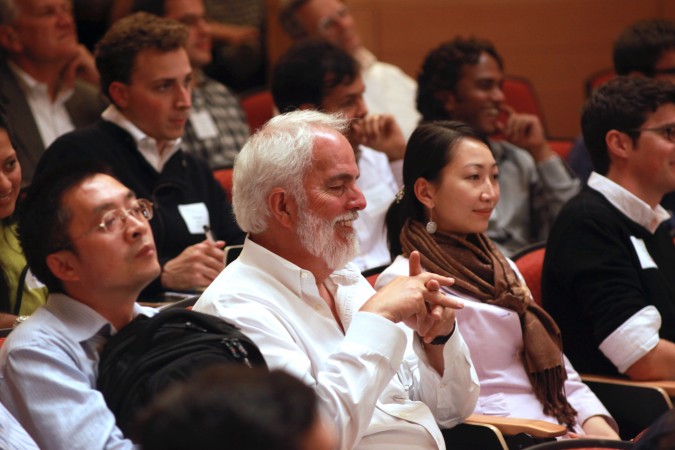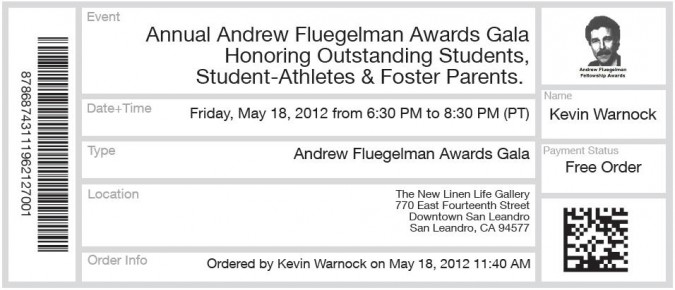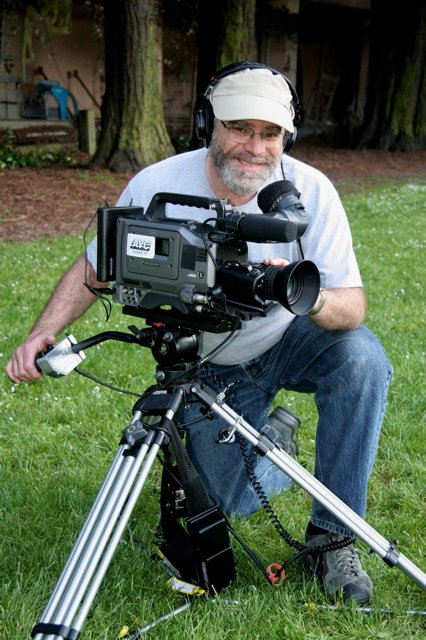Archive for the ‘Stuart Sweetow’ tag
Berkeley Entrepreneurs Forum, 2012-13 Angel & Venture Capital Financing Overview – August 30, 2012
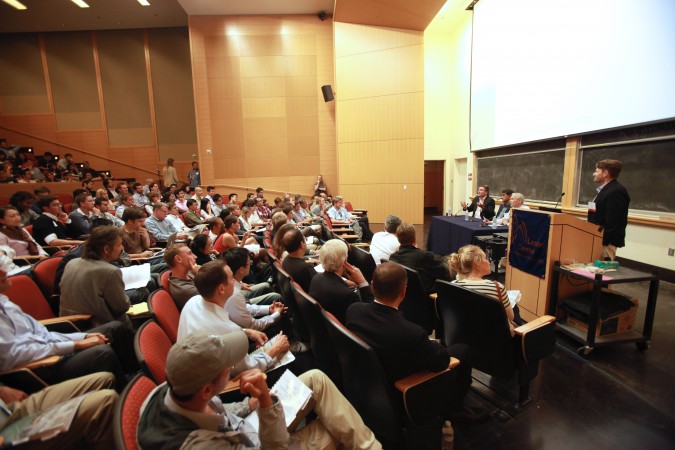
The Berkeley Entrepreneurs Forum, August 30, 2012, held at Stanley Hall, room 105, because Anderson Auditorium was booked
On August 30, 2012 I attended the 2012-13 Angel & Venture Capital Financing Overview at The Berkeley Entrepreneurs Forum.
The August 30th Forum was the first of this academic year. The Berkeley Entrepreneurs Forum is a production of The Lester Center for Entrepreneurship & Innovation at the Haas School of Business at the University of California Berkeley.
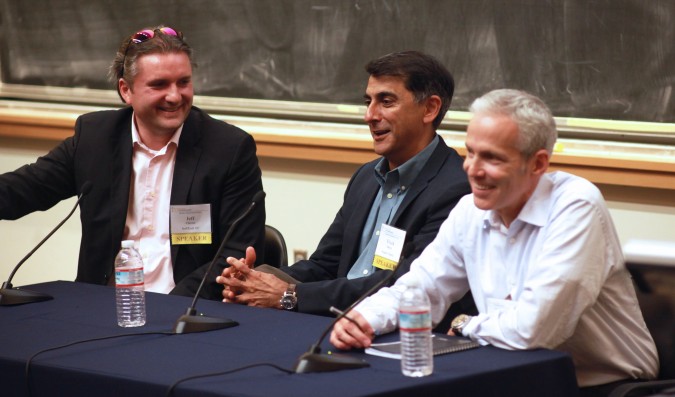
Panelists Jeff Clavier, Vivek Mehra and Jim Barnett at Berkeley Entrepreneurs Forum, August 30, 2012. Photo by Kevin Warnock.
The first Forum of the year for years now starts with Steve Bengston’s presentation of the Shaking the Money Tree report. I suspect Bengston has made this presentation hundreds of times, as he gives it not just at the Forum, but at many venues. In fact, I suspect it’s Bengston’s signature talk.
You can watch the full video of the Forum here to see what happened. I am a photographer, not a videographer. This is not the official video, which The Lester Center will publish in its entirety some weeks from now, I believe. I suggest you watch that version, because it will have professional sound from a mixing board, the slides will likely be full screen so you can read them, and the camera used is far better than the still camera I used that happens to also shoot video. I did not upload this video at full quality, since such video takes far longer to compress for Internet display.
There were some good lines from the speakers. I’ve transcribed my favorites here:
Steve Bengston:
“It [venture capital] finally got big in the mid to late 90s and now we worry when the venture business goes from $30B to $20B, but it never got above $20B until 1998 so the scale of the venture business is just much bigger than it’s ever been.”
“What about Series A, ‘didn’t that collapse?’ It is down certainly from the peak but you can see whatever that is there are $200M to $400M of series A deals each quarter just in Silicon Valley and that represents about 50 to about a 100 Series A deals in Silicon Valley each quarter.”
“The good news is there is a lot of money for your deal if you meet the certain metrics for an investor.”
“If you’re going to raise money which is still hard to do, you’re going to raise around $3M. That’s a typical deal. In this era, that buys you a lot more months of burn than it would have say ten years ago.”
“You have 300 to 400 M & A exits in the US a year in the US, much higher than the old days.”
“The top five or so [venture] firms are raising 80% of the money.”
“It begs the question ‘How many VCs do you need to find the 30 good companies every year?’ Right now the answer is about 3,000. For many people that seems high.”
“China has been the number one economy 15 of the last 18 centuries. So, just because they have had a couple of bad centuries you don’t want to count them out. They are used to being on top.”
Jeff Clavier:
“The challenge at the early stage is that even great founders can come up with really stupid ideas.”
“Do it because you are passionate about it, not because it’s cool.”
“I passed on airbnb that some showed me when it was called air bed and breakfast and I said ‘air bed and breakfast… are you f—ing kidding me?'”
Jim Barnett:
“One of the danger signs that all the partners look for is what we call ‘complexifiers’ — people that take what is otherwise a relatively simple business proposition or business idea and figure out how to make it complex.”
“The one thing I would say to those thinking about starting a company or planning to start a company is just go do it. Your idea really doesn’t need to be that great. It really doesn’t. If you’re great, it will get funded.”
“I want to dispell a myth that you learn more from your mistakes than you do from your successes. I think that is just a bunch of crap. I really do. I think you learn from watching success — pattern matching, whether it’s in sports whether it’s in business or anything else so for those of you that are in the audience that are MBAs or that are undergrads that are thinking about what do if they’re not going to start a company I would say ‘go work for a successful company and watch.’ You’ll learn a lot more than doing three failed startups.”
Vivek Mehra:
“I hate doing deals over the weekend. I have never done one and I hope I never have to do one. It’s just impossible to get to know the entrepreneur.”
“When there are very asymmetric equity assignments amongst the team you know what they really think about each other.”
Here is my succinct summary of this Entrepreneurs Forum:
- The venture industry is in trouble, but there is still plenty of money around.
- Lots of angel investors are making what will prove to be poor investments so this increases the chances that you can raise money even if you or your idea are not that good.
- There is a lot to be gained by just starting a company, so if you are passionate about doing so, then go for it. You won’t ruin your chances for future success by failing a few times.
- However, if you’re not going to start a company, you should work for a clearly successful company so you can pay attention and learn from the success of others.
- Surround yourself with high quality people.
- Don’t make things more complicated than they need to be.
- Have your role worked out with your founders before you pitch to investors. Lopsided equity divisions speak loudly to investors what you think of your co-founders.
- Increase your chances of getting funded by persistently pursuing entrepreneurship over years, so investors may gauge your actions over your words.
- Work hard and recognize that a lot of success may be attributed to your ability to forge healthy and respectful long term relationships with people in the community.
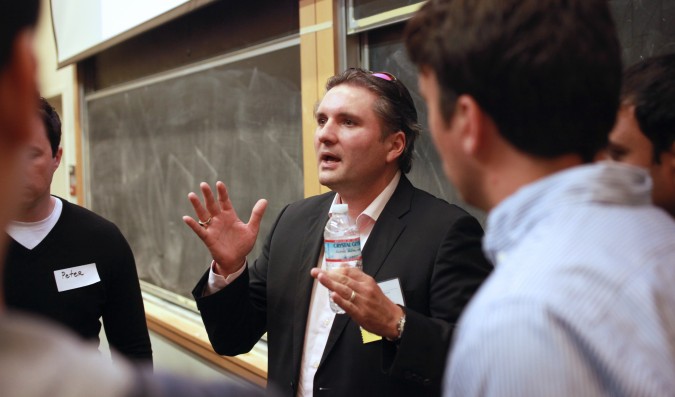
Panelist Jeff Clavier answers questions at the Berkeley Entrepreneurs Forum, August 30, 2012. Photo by Kevin Warnock.
From the Berkeley Entrepreneurs Forum website, here are the introductions for the moderator and speakers — I added the hyperlinks to make it easier for you to learn more about the panelists and their many interests:
Samuel B. Angus
Partner
Fenwick & West LLP
Samuel B. Angus is a partner in the Corporate and Venture Capital Group of Fenwick & West LLP, a law firm specializing in technology and life sciences matters. Mr. Angus is resident in the San Francisco office and his practice concentrates on advising start-up/venture-backed companies, venture capital and debt financings, mergers and acquisitions, intellectual property licensing, joint ventures and general corporate matters. Mr. Angus represents a broad range of companies from privately held start-up companies to publicly traded corporations, including Airbnb, Github, Marin Software and oDesk. His practice also includes advising entrepreneurs and investors.
Jim Barnett
Partner
Shasta Ventures
Jim Barnett is a Partner at Shasta Ventures and has been a highly successful serial CEO and entrepreneur. Jim is currently chairman and co-founder of Turn, chairman of Extole and Sojern, and a board member of Needle and RelayRides. From 2004 until 2009, Jim was CEO, chairman and co-founder of Turn, the leading platform for managing data driven digital advertising. Before that he was president of Overture Search, a division of Overture Services, Inc. Jim joined Overture via its acquisition of AltaVista Company, where he was president and CEO. In this role, he led the company’s successful turnaround and sale to Overture.
Jim was also president of Ancestry.com (MyFamily.com) and president and CEO of ThirdAge Media, which was acquired by Ancestry.com. Prior to that, Jim was president and CEO of Infogrammes North America, a leading global publisher of video games and entertainment software. He was also chairman, president and CEO of Accolade Inc, Infogrammes’ predecessor company, and prior to that was chief operating officer of an “Inc. 100 Fastest Growing Private Companies.”
Jim has served on the boards of many private and public companies including SideStep, Inc. where he was chairman and Petco where he was also an early investor. Jim earned a bachelor’s degree, MBA and J.D. from Stanford University.
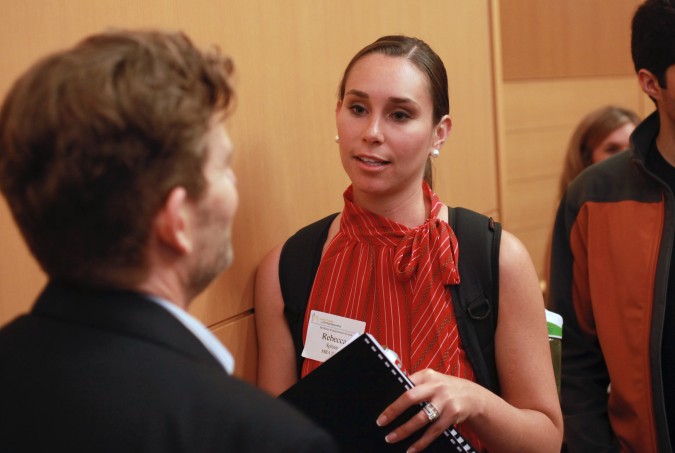
Moderator Sam Angus listens to student Rebecca Spitzer pitch her startup at the Berkeley Entrepreneurs Forum, August 30, 2012
Steve Bengston
PricewaterhouseCoopers
Steve Bengston heads the Emerging Company Services (ECS) group at PricewaterhouseCoopers. ECS acts as “mentor capitalists” for young, high potential companies.
Before joining PwC, Steve had 20 years of experience in a variety of marketing, business development and general management roles at several high tech companies in the Bay Area. Most recently, he was Pres/CEO of ynot.com [Note: not the website now online at that URL], a leading international emarketing and greeting card company. Previously, he was VP Marketing & Business Development at Worldview Systems, an Internet travel pioneer. At Worldview, Steve helped launch and market Travelocity with Sabre Interactive.
Steve has a BA in Economics and MBA from Stanford University. He works closely or sits on the Advisory Board at Churchill Club, SVASE, Life Science Angels, Bay Bio, and the Stanford/MIT Venture Lab, has taught classes on startups at UC Berkeley, San Jose State, Santa Clara Law School, Hastings Law School, and Stanford, and is active in a variety of other organizations in the Bay Area targeting entrepreneurs and investors. He is a frequent moderator/panelist at both university and industry sponsored events.
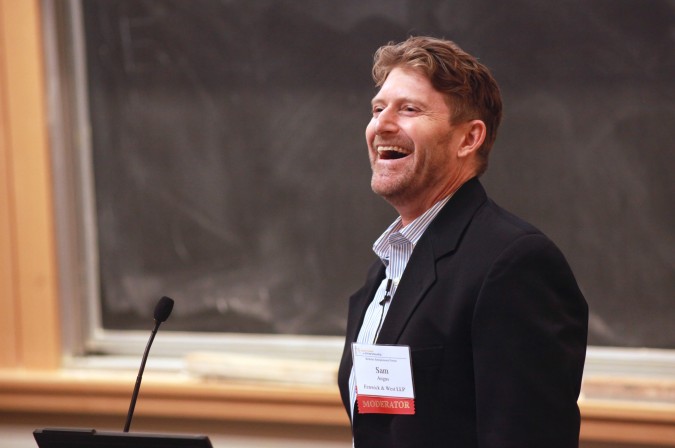
Sam Angus, a partner at law firm Fenwick & West LLP, moderates a panel at the Berkeley Entrepreneurs Forum, August 30, 2012
Jeff Clavier
Founder and Managing Partner
SoftTech VC
Based in Palo Alto, California, Jean-Francois “Jeff” Clavier is the Founder and Managing Partner of SoftTech VC, one of the most active seed stage investors in Web 2.0 startups. Since 2004, Jeff has invested 125 consumer internet startups (Fund I, Fund II, Fund III) in areas like social media, monetization, search, gaming or B2B/B2C web services. These investments are typically located in Silicon Valley, New-York and Boulder. With over 20 years of operational, entrepreneurial and venture capital experience, Jeff is able to add relevant perspective and value to his companies as they grow from inception to maturity, and hopefully, success.
Jeff was recognized as one of the 13 “Web 2.0 King Makers” by (late) Business 2.0. BusinessWeek named him one of “The 25 Most Influential People on the Web” in 2008, and one of the “Top 25 Angels in Tech” in 2010. He was also nominated in the “Best Angel” category at the Crunchies in 2009 and 2010. He is often noted for his investments in categories such as “passion-centric communities” or online gaming, or for having sold a number of his Web 2.0 startups to the likes of Yahoo, AOL, Intuit or more recently PayPal, Twitter and Groupon.
Some of Jeff’s representative investments include Mint (Intuit), Brightroll, Truveo (AOL), Userplane (AOL), Rapleaf, Ustream, Milo (eBay), Blekko, Eventbrite, Tapulous (Disney), DNANexus, FanBridge, BillFloat, Fab, Gigwalk, Byliner and Wildfire.
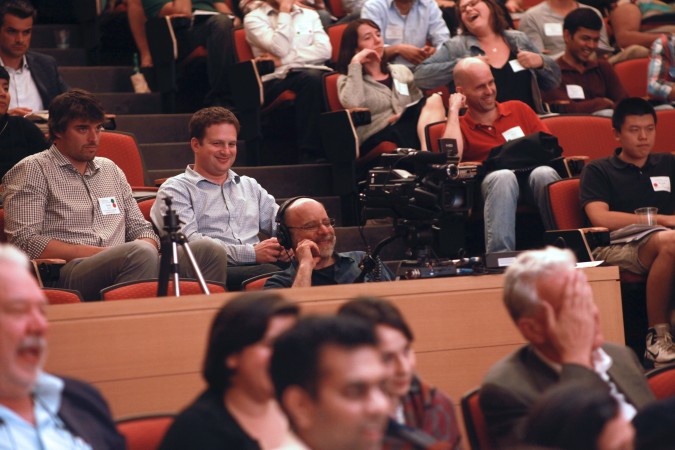
Stuart Sweetow, owner of Audio Video Consultants, capturing video at the Berkeley Entrepreneurs Forum, August 30, 2012
Vivek Mehra
August Capital
Vivek joined August Capital in 2003. He invests broadly in IT infrastructure and areas of interest include data center technologies, systems management, security, storage, and cloud computing systems and software. Prior to joining August Capital, Vivek co-founded Cobalt Networks in 1996. As CTO & VP of Product Development, Vivek built the first successful server appliance and grew Cobalt into a worldwide leader in the category, culminating in a successful IPO and acquisition by Sun Microsystems for $2B. At Sun, Vivek served as the Vice President and General Manager of the Cobalt Business Unit and a member of Sun’s Technical Architecture Council. Prior to founding Cobalt, Vivek held a number of technical and management positions at Apple, SGI, and Digital Equipment Corporation and successfully developed numerous products including Internet enabled set-top boxes, PDAs, RISC workstations, and high performance graphics subsystems.
Vivek received a BS in Electronics from Punjab University, India, and an MS in Computer Engineering from Iowa State University.
To my knowledge, I have been attending The Berkeley Entrepreneurs Forum for longer than anyone else besides Jerry Engel, who founded The Lester Center in 1991 and was its Executive Director for nearly two decades.
I have some suggestions to improve the The Entrepreneurs Forum, which I will describe here. I am posting these suggestions publicly because they are likely applicable to numerous programs across the globe, and I’d like to see these ideas adopted widely if people think they are worthwhile.
1. Dispense with the table panelists sit at. The table doesn’t look good on camera or video, and over time the majority audience for the Forum should be watching online, since the rooms frequently sell out already. Panelists should sit on arm chairs or couches, like they do at most tech conferences that I attend. The moderator should sit with the panelists and not be off to the side standing at a podium. All the people on stage should be outfitted with wireless lapel microphones. I would like the Forum to appear more conversational in style. The table separates the speakers from the audience, where arm chairs suggest a residence for a more intimate vibe.
Here’s an example of a more visually appealing way to run a panel. Steve Bengston is the moderator for this panel at The Churchill Club, where he is a member of its Board of Directors and its past Chair.
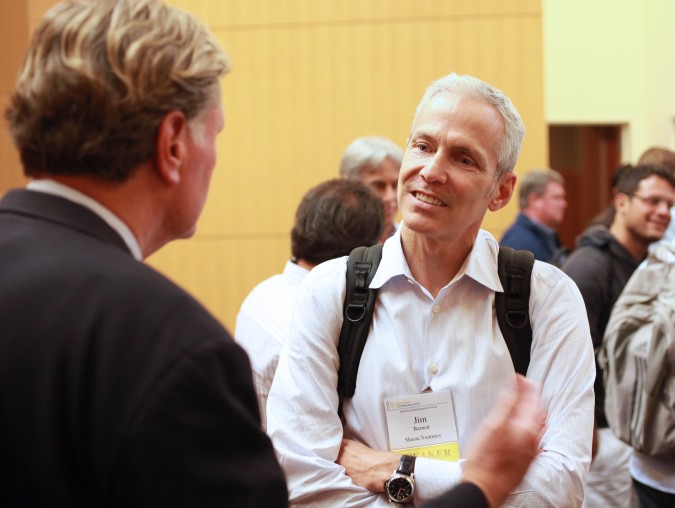
Jeff Burton, the brand new Executive Director of the UC Berkeley Skydeck, talks with Jim Barnett of Shasta Ventures, August 30, 2012
2. Commercial bottled water should be forbidden on stage, even if the speakers bring it with them. Nearly all the conferences I attend serve water from pitchers into real glasses. Bottled water is an evil product, and it looks bad in photographs and video to see those bottles. Image is important, and promoting bottled water by showing it on stage should stop.
3. Commercial bottled water should not be a beverage choice during the networking hour. Tap water should be offered, and it should not require a drink ticket.
4. When it comes time for audience questions, invite the questioner to sit on stage in an arm chair or on the couch while they ask the question and while they are receiving the answer. This will give the questioner time on video, and will permit them to look the speakers in the eye. This will be a treat for the audience members, because they’ll feel they get to ‘meet’ the panelists for 60 or 120 seconds. Questioners can line up to get their turn on stage. Questioners should be encouraged to state their first and last name, so they can be identified online.
5. Although I appreciate that it’s a lot of work, the Forums should be transcribed, and the transcribed text should be posted online. This is a certain way to get more traffic to The Lester Center website, and it’s likely to increase the interest in the Forum from attendees that can’t attend in person.
6. All Forums should be archived online, including Forums from ten and twenty years ago. Forums should never expire and be removed.
7. The ‘numbers’ should be videotaped and included in the online video. The numbers are often the most interesting part of the evening. The contact information for the number presenters should be posted online, with permission of course, and there should be a hyperlink to the project the person is working on.
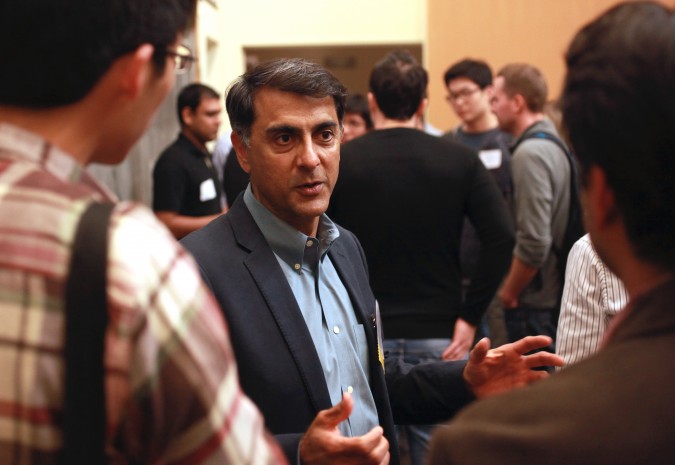
Vivek Mehra, a partner at August Capital, answers questions posed by attendees at the Berkeley Entrepreneurs Forum, August 30, 2012
8. The photographs taken by Bruce Cook, the official photographer, should be publicly posted to Facebook, and should be tagged. Once the identities of the people pictured are known via the tagging, the captions for the official Lester Center website should be updated to identify everyone whose name is known. If required, change the terms of the tickets purchased to give UC Berkeley the right to identify the people by name. Offer an ‘opt out’ list during checkin. Having the names with the pictures will increase traffic to The Lester Center website, since people will search for those names for decades to come. Invite people to tag the pictures in the emails The Lester Center sends out and via Facebook status updates.
9. A vast collection of at least 5,000 of Bruce Cook’s unpublished photographs of the Forum from the last twenty years should be published to Facebook and the Web, and they should be tagged and captioned. This was entirely my idea — Cook did not hint that I propose such an idea. The majority of the pictures published should be of the networking hour, to get as many people from the audiences over the years tagged as possible.
10. The Forum should be oversold, like airplane seats. This August 30th Forum was ‘sold out’ but there were unfilled seats in the auditorium, which takes away from the excitement of a sold out show. If too many people show up, they can watch on video monitors in the Bank of America Forum, and as compensation for not getting a seat, their entrance fee can be 100% refunded. I predict the revenue over time from overbooking will more than make up for the refunds that need to be given. Attendees should be told when they buy their tickets they risk being bumped, and encouraged to arrive early to be sure they get a seat.
11. The reminder to ‘Like’ The Lester Center on Facebook should be repeated on a poster displayed during the Forum. The Forum’s Twitter handle should also be on this poster.
12. Attendees should be given a perk if they follow the Forum on social networks, such as a second drink ticket on their next visit to the Forum, to encourage getting as many followers as possible. Currently attendees may eat unlimited quantities of food at the Forum, but are permitted only one drink, either with alcohol or without.
13. Attendees should be invited to blog and post about the Forums, and The Lester Center site should find and link to the best examples of such efforts, to encourage people to write about the Forum.
I am one of the only bloggers writing about the Forum, but there should be at least several.
14. I love the luxurious food served during the networking hour, but it sure seems like it must cost a fortune. I think it would be more than fine to switch to less fancy food. There is precedent for this. Last year at the Founder School Demo Day what appeared to be inexpensive sandwiches were served, but the event was superb and not diminished by the more everyday food. I suspect the food budget for the Forum could be cut by two thirds without getting more than a handful of complaints. The Forum is still too expensive at USD $25 a ticket, and I bet it loses money even at that price. When I started attending in my mid twenties, the cost was prohibitive. It was only due to my getting free tickets from my employer at the time, Cooley, that I attended regularly. The goal should be to get lots of currently poor entrepreneurs in the making to attend, including but not limited to Berkeley students.
I suggest the price should be no more than $10. To get the price that low, I suggest alcohol should cost extra.
That is all my suggestions for now. The Forum is already a success, or I would not have attended for twenty years. I am trying to make the Forum better.
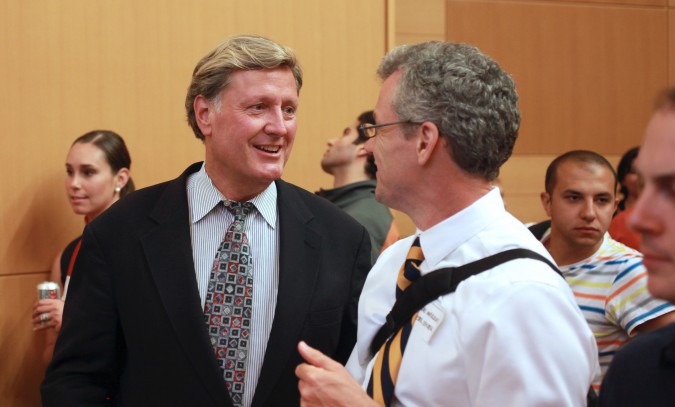
Jeff-Burton, left, the brand new Executive Director of the UC Berkeley Skydeck talks with Andre Marquis, Executive Director of The Lester Center for Entrepreneurship & Innovation, August 30, 2012. Photo by Kevin Warnock.
I upload pictures to this blog at the maximum resolution my camera produces — 21 megapixels. Click on them twice in delayed succession to see them at full size. I shot these pictures at ISO 4,000 due to the low lighting levels.
Click here to see all the posts I have written about the Berkeley Entrepreneurs Forum.
The law firm Fenwick & West LLP where Sam Angus is a partner produced and gave away a great 80 page booklet at the Forum. Retired Fenwick attorney Jacqueline Daunt wrote a fantastic introduction to startups that includes a capitalization table for a hypothetical company from pre-funding stage through a public stock offering. Thank you Fenwick! If I can post this booklet, please let me know and I’ll update this post with a link to a PDF scan of the booklet.
Finally, as an end note, I met Steve Bengston in 1999 during the first dot com boom, when he agreed to help me with Hotpaper, my startup at the time. It turned out I didn’t call on him much, since I lined up financing almost too easily, but I will never forget pitching him at his PriceWaterhouseCoopers office in San Jose, California USA, and him telling me at that meeting that he would help me. Bengston is well known, and I was thrilled to have his support, especially back then when I didn’t know many people or know much of anything.
Annual Andrew Fluegelman Awards Gala Honoring Outstanding Students, Student-Athletes & Foster Parents, May 18, 2012
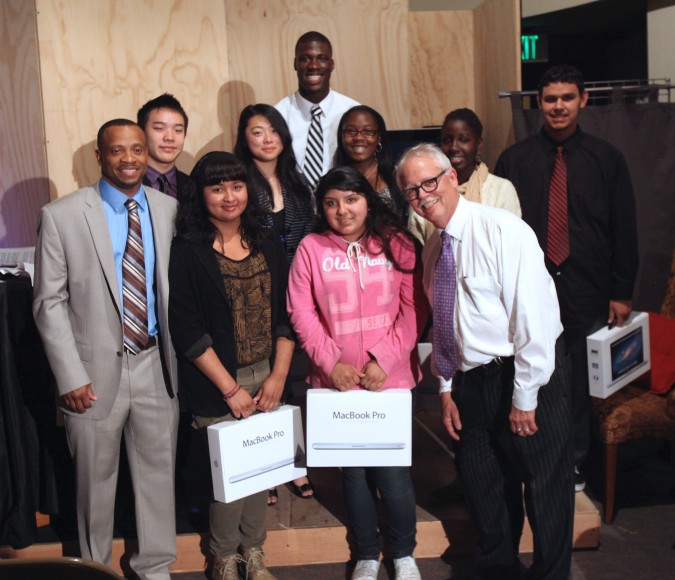
Winners of 2012 Andrew Fluegelman Foundation Fellowship Awards showing off their new Apple MacBook Pro laptop computers, May 18, 2012. Bruce Bouligny on left and David Bunnell in white shirt.
On Friday, May 18, 2012, the day of the Facebook Initial Public Offering of stock, I attended the annual Andrew Fluegelman Foundation Fellowship Awards Gala, held at the Linen Life Gallery at 770 East 14th Street, San Leandro, California USA. Here is the Facebook page for the Andrew Fluegelman Foundation. Bruce Bouligny is the Director of the Fluegelman Foundation.
I learned of this event the morning of the event, thanks to a Facebook status update from Harry McCracken, Editor-at-large at Time Magazine. McCracken encouraged his Facebook subscribers, of which I am one, to attend this event. McCracken also linked to a piece he wrote for Time entitled Remembering Andrew Fluegelman, a Quiet Giant of the PC Revolution that introduced me to Andrew Fluegelman, a man I had not previously heard of. Once I read McCracken’s piece on Fluegelman, I got a ticket for the Awards Gala and attended as a blogger. Amazingly, the tickets were free, although they did ask for a modest donation at the door, which I happily made.
Andrew Fluegelman disappeared in 1986, and it’s assumed he committed suicide by jumping from the Golden Gate Bridge. He was 42, and his body was never found.
I had only been at the Linen Life Gallery for mere minutes when my friend Stuart Sweetow came over to say hello. I recognized him but couldn’t place him, as I only see Sweetow at the Berkeley Entrepreneurs Forum at The Lester Center for Entrepreneurship and Innovation at the Haas School of Business at the University of California at Berkeley. He’s the videographer for the forums, and has been for some 15 years. I have had the privilege of appearing in one of Sweetow’s videos that he created for the Forum.
Sweetow absolutely made my evening.
How so? It turns out that Sweetow runs a business called Audio Visual Consultants. He’s been in business since 1983 — impressive. In 1986 he was hired by PC World, which Fluegelman co-founded with David Bunnell, to produce a video tribute to Andrew Fluegelman.
A few weeks ago, Sweetow was moving his company’s office and studio to new space and he stumbled upon the ancient video cassette he had produced decades earlier. He decided to call David Bunnell, the co-founder of the Andrew Fluegelman Foundation (and PC World Magazine), to ask if he wanted the tape. Bunnell was probably stunned to get Sweetow’s call. The copy PC World received decades ago had been lost. It was thought that it would never resurface. Thanks to Sweetow, the Foundation and presumably PC World has the video again, and it’s been posted to YouTube so a wider audience can view it.
What a heartwarming story. Here’s Sweetow’s video:
I asked Sweetow if I could blog about this story, and he said that I may.
Sweetow then pointed out that David Bunnell was standing near us. Sweetow offered to introduce me, and I accepted.
David Bunnell co-founded PC World Magazine with Andrew Fluegelman. I used to read PC World frequently. Before the Internet, such magazines were required reading for those interested in technology. You read such magazines the way we read websites like TechCrunch and Engadget today. I got to meet a publishing legend Friday night.
Happily, PC World is still in business, with a vibrant online presence in addition to the physical editions of the magazine.
I asked David Bunnell if I could photograph him, and not only did he agree, but volunteered to step outside into the still bright daylight so I could get a well lit portrait of him. Had he not volunteered, I would have directed him outside, as the light there was perfect. The pictures of Bunnell are at the bottom of this post.
I used my Canon 5D Mark II for these photographs, and I uploaded them at full 21 megapixel resolution. Click on the pictures to see them at full size.
Here is what David Bunnell wrote for the official paper program distributed at the event:
“Andrew Fluegelman (1942-1985)
During his brief life, Andrew made major contributions to the booming computer revolution. In addition to co-founding PC World and Macworld magazines, he wrote PC-Talk, the software program that for the first time made it possible for personal computers to exchange data over a phone line.
Believing that PC-Talk should be available to as many people as possible, Andrew came up with the novel idea of simply giving it away and asking people to send in a donation if they liked the program.
Andrew called this method of distributing software, “freeware.” Thousands of other programmers started making their software available this way, which helped the PC industry grow even faster.
Underlying Andrew’s work was his profound belief that personal computers have the power to transform anyone’s life. Whatever a person’s background and circumstance, if they had a computer their lives could be dramatically changed for the better.
With the help of some of Andrew’s other friends, I established the Andrew Fluegelman Foundation to keep his memory alive and to realize his vision that computers can make a dramatic difference.
Working with other nonprofit organizations, we identify outstanding high school seniors who have overcome the challenges of growing up in poor neighborhoods and who have been accepted into university, college or other advanced educational program. They also must demonstrate a desire to “give back” to their communities.
In Andrew’s name, we give these students a Macintosh laptop computer, printer and training in the use of Google applications, courtesy of Google.
So far, all the students who have won Fluegelman Fellowships have gone on to be successful in college. They arepot to us that owning their own Macintosh computers has been a huge part of that success.
I truly believe Andrew would have loved this program, and that his spirit is with us tonight.
–David Bunnell”
Fluegelman in 1982 created PC-Talk, the first dialup communications program for IBM Personal Computers and their clones. Back then, computers were connected via standard wired telephones directly to each other, not by going through central servers run by companies like AOL, Compuserve or Prodigy. Fluegelman distributed PC-Talk at no charge, and encouraged people to copy it and give it to friends. He made money by asking but not requiring that people mail him money via postal mail. He suggested donations of USD $25 and later more. That was a fair amount of money back then. I suspect it still works today, at least on Windows XP.
Fluegelman was the first Editor-in-Chief of PC World magazine. He interviewed Bill Gates in 1984, as shown in this picture from the Fluegelman Foundation’s Facebook page:
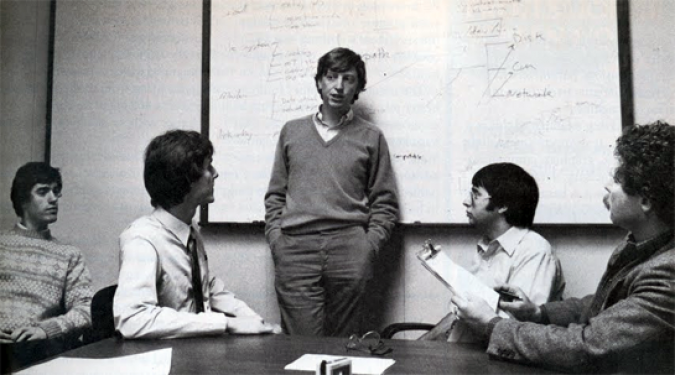
Andrew Fluegelman, on the far right, interviewing Bill Gates, standing, in 1984. Photographer unknown.
The Fluegelman Foundation honors Andrew Fluegelman’s memory by awarding Apple MacBook Pro computers to seven deserving high school seniors each year. Fluegelman believed that a computer could change a person’s life, so he would have approved of the work this foundation is doing.
This year Apple MacBooks were awarded to:
- Daniel Rodriguez – Castlemont High School
- Teresa Unique Cole – MetWest High School
- Andranee Nabors – Berkeley High School
- Cara He – Skyline High School
- Rocio Montes – Skyline High School
- Brian Lien – Skyline High School
David Bunnell and Bruce Bouligny took turns reading portions of the winning essays these winners submitted to compete for the laptops. The students were not given a chance at the microphone to say ‘thank you.’ I suspect this was the first time these students had been on stage outside of school. In future years, I suggest the organizers allow each student 60 seconds at the microphone to say thank you. They should be told of this opportunity in advance so they can prepare and practice their remarks. They will likely be nervous, but it should be a condition of winning that they say something. It will be a valuable learning experience to speak before strangers, and it’s one they won’t likely ever forget. The audience I am sure would welcome hearing from the students.
I tried hard to get permission to photograph the winners individually like I was able to photograph David Bunnell and Larry Magid, below. But I didn’t ask soon enough and the time simply ran out. I would have loved the chance to spend two minutes with each student properly photographing them. If I attend next year, I will prepare in advance with the organizers so that I can do this.
The Fluegelman Foundation also gives awards to an outstanding foster parent each year. I did not learn how this award is connected to Fluegelman, and there may be no overt connection. Whether there is or not isn’t important. The evening was an inspiring delight, and I am so glad that I attended.
Two foster parents spoke.
The first foster parent to speak was Tracy Beckham, who has 12 children. Eleven she and her husband adopted after doctors told her they would not be able to conceive and carry to term a biological child. We learned that their youngest child, the girl in the white dress below, is their biological child, and she was conceived naturally with no assistance from the fertility industry. Beckham told us how doctors at first thought she was sick, but eventually concluded she was pregnant. What a happy surprise.
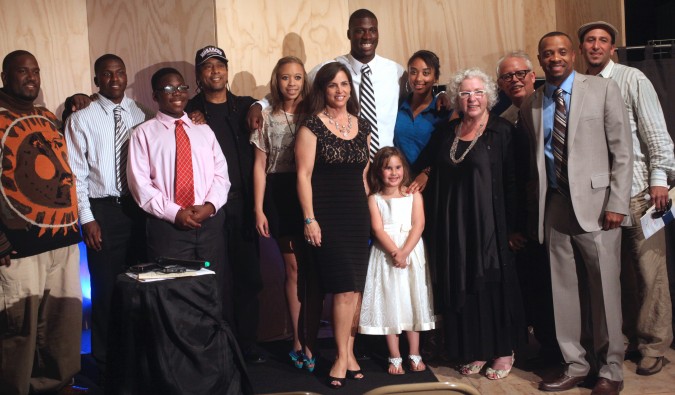
Tracy Beckham with her family plus a few others, May 18, 2012 at Andrew Fluegelman Fellowship Awards Gala. Photo by Kevin Warnock.
Beckham’s 6’6″ son Dorial Green-Beckham, the tallest in the two shots immediately above and below, is already famous, with his own entry in WikiPediA, I learned. The pictures I took of him are likely to get this blog some significant traffic. Thank you Dorial and thank you to his mother Tracy, who gave me permission.
Dorial is a famous high school football player. According to The Columbian Missourian newspaper, Dorian was the most recruited high school football player in the United States in 2012. Here’s a long piece that details how intense this process was.
Dorial signed with the Missouri Mizzou Tigers, after a courtship that lasted years. I had no idea before today that even happened. I don’t follow football, and I only occasionally watch the Super Bowl.
I had never heard of Dorial before this event. I am glad that I met him, and he was gracious and patient as I set up the pictures you see here. I gave him posing directions just like I give the female models I photograph. I wonder what he thought of me given that he’s probably been photographed by hundreds and hundreds of photographers to date.
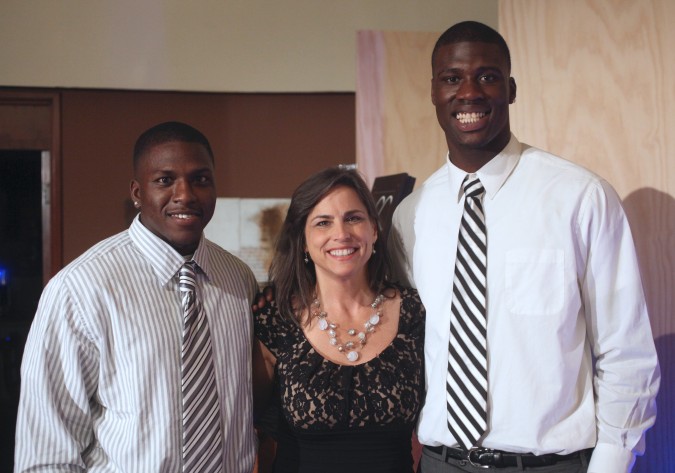
Tracy Beckham with 2 of her 12 children including Dorial Green-Beckham on the right. May 18, 2012 in San Leandro, California. Photo by Kevin Warnock.
Have a look at this YouTube video that shows Dorial breaking the United States national receiving record for high school football.
Here’s a clip of Dorial catching a 79 yard pass with one hand during the 2012 Army All American Game. Looks impressive to me:
Dorial Green-Beckham was awarded the first National Fellowship awarded by the Fluegelman Foundation, and Dorian was given an opportunity to speak to the audience, which he accepted.
The second foster parent to speak was Athaline Burns, shown in the photograph below holding her award plaque for East Bay Foster Parent of the Year.
Burns told the crowd she provided care to about 100 foster children that lived in her home over the years. This is an astonishing and important contribution to society. Burns kept her remarks short, so I don’t have any stories to relate about her remarkable life. I didn’t have the opportunity to talk with her after the event, which I regret. I would like to interview her for this blog at some point, and meet her family to hear about their experiences first hand. I have at times considered becoming a foster parent, so I have more than a casual interest in this subject.
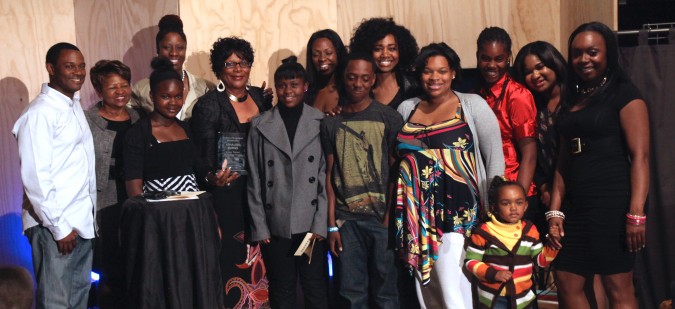
Athaline Burns, holding award plaque, shown with her family. Burns is East Bay Foster Parent of the Year. May 18, 2012 in San Leandro, California. Photograph by Kevin Warnock.
Here is the portrait that I took of David Bunnell and Larry Magid together:
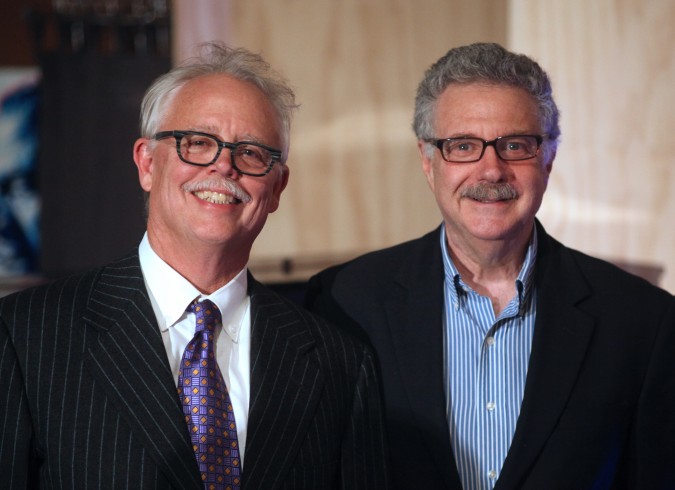
David Bunnell and Larry Magid, May 18, 2012 at Andrew Fluegelman Foundation Fellowship Awards Gala in San Leandro, California. Photo by Kevin Warnock.
Bunnell and Magid provided commentary at the start of the event about the storied life of Andrew Fluegelman. I got the distinct impression that both Bunnell and Magid are elder statesmen in the technology industry, so I am so grateful that I got to photograph them together and separately, and that the results were so pleasing. Magid asked if he could use the results, and I happily told him that he may. Of course, Bunnell may as well, as well as all the others that I photographed. I am very flattered when I encounter my photographs around the web and on other peoples’ Facebook pages. Twenty four of my Facebook friends are also friends with Magid.
Larry Magid is Co-Director of ConnectSafely, a non-profit. Magid provided Gala attendees with free copies of the book A Parent’s Guide to Facebook (also published in Arabic). I have a copy, and from reading part of it I can say it’s well written and likely to be very valuable to parents. I’ve never seen such a lushly produced guide to safely using potentially a potentially dangerous site like Facebook. I plan to read the entire book. Here’s an abstract of what ConnectSafely is about, from the group’s website:
“ConnectSafely is for parents, teens, educators, advocates – everyone engaged in and interested in the impact of the social Web. The user-driven, all-media, multi-platform, fixed and mobile social Web is a big part of young people’s lives, and this is the central space – linked to from social networks across the Web – for learning about safe, civil use of Web 2.0 together. Our forum is also designed to give teens and parents a voice in the public discussion about youth online safety begun back in the ’90s. ConnectSafely also has all kinds of social-media safety tips for teens and parents, the latest youth-tech news, and many other resources.
ConnectSafely.org is a project of Tech Parenting Group, a 501(c)3 nonprofit organization based in Palo Alto, Calif., and Salt Lake City, Utah. The forum is co-directed by Larry Magid of SafeKids.com and Anne Collier of NetFamilyNews.org, co-authors of MySpace Unraveled: What It Is and How to Use It Safely. (Peachpit Press, Berkeley, Calif., July 2006).”
Larry Magid is also the on-air technology analyst for CBS. Magid has over 62,000 subscribers on Facebook.
Here is the portrait that I took of David Bunnell:
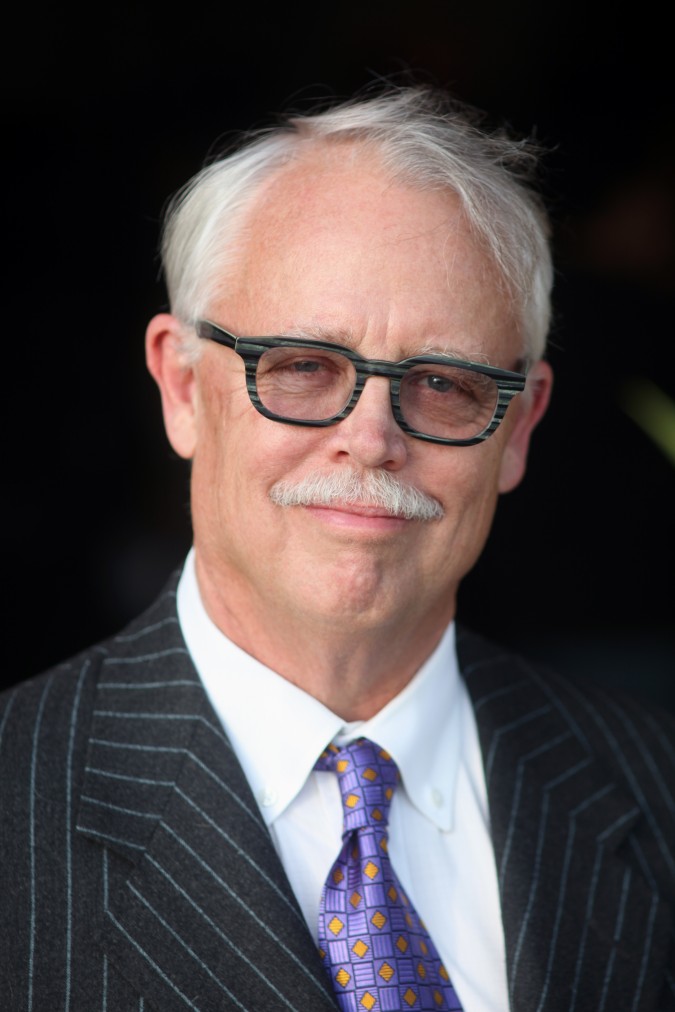
David Bunnell, co-founder of Andrew Fluegelman Foundation, May 18, 2012. Photographed by Kevin Warnock.
Here is the portrait that I took of Larry Magid:
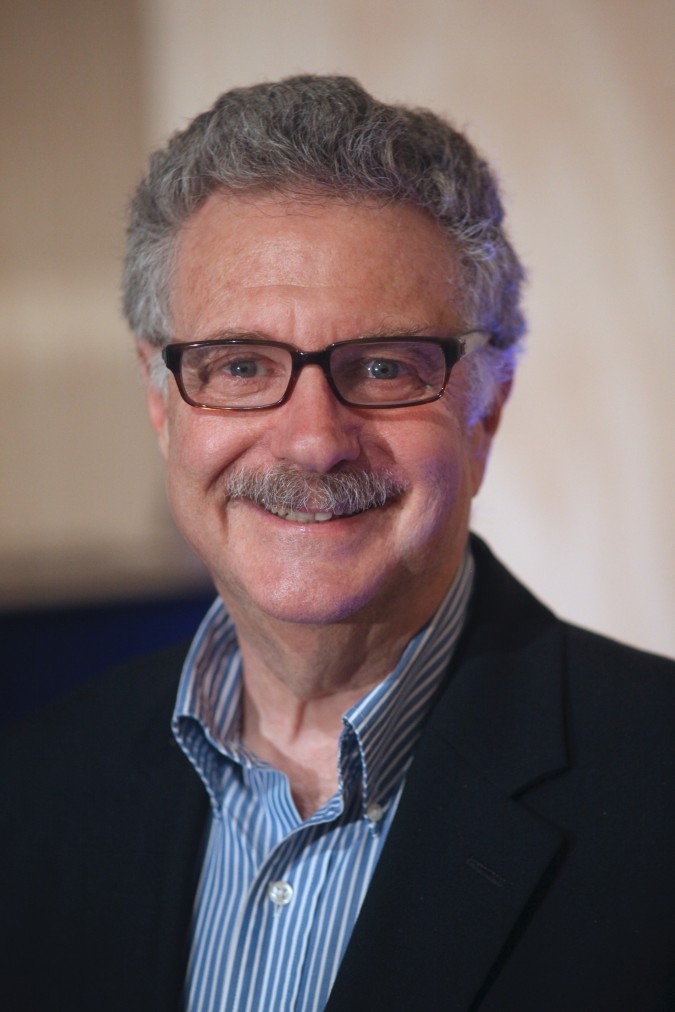
Larry Magid, on-air technology analyst for CBS, photographed May 18, 2012 at the Andrew Fluegelman Foundation Fellowship Awards Gala. Photo by Kevin Warnock.
Here is a photograph of the reception prior to the awards ceremony. The food and drink were outstanding, thanks to B Restaurant and Bar, Trader Joe’s, Markham Vineyards, Carl Talaue Catering, RSVP Catering and T-Rex BBQ.
The Skyline Jazz Band, made of up musicians from Skyline High School, played during the reception. The band’s director is Vincent Tolliver. The musicians are:
- Olivia Ports – Drums
- Ella Pearson – Piano
- David McMillan – Guitar
- Zach Seidl – Bass
- Jeff Seidl – Trombone
- Jeramy Kaetzel – Trumpet
- Andrew Wong-Rolle – Alto Saxiphone
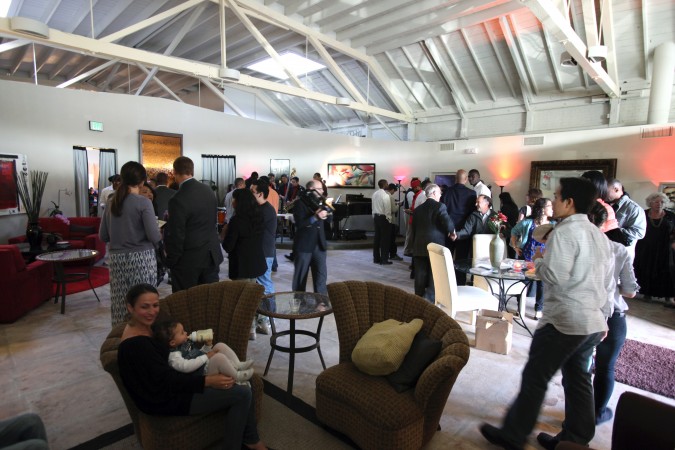
Reception at 2012 Andrew Fluegelman Foundation Awards Gala in San Leandro, California, May 18, 2012. That's Stuart Sweetow in the center holding the video camera.
Charleston Pierce was the Master of Ceremony. I found him vibrant, charismatic and engaging. He said he’s a graduate of San Francisco School of the Arts, or SOTA. This school is located in the same building where I went to high school. That school, J. Eugene McAteer High School, was dissolved in 2002 due to its being atrocious, which I can personally confirm.
SOTA seems to be churning out winners, like Devon Ivie, Havel Weidner and Cristina Rey, all of whom I met in February, 2012 at the San Francisco Mock Trials citywide finals. They were on the student team representing SOTA, which this year competed with Lowell High School, generally thought to be the best public high school in San Francisco. SOTA lost to Lowell this year, but has won over Lowell multiple times in past years. The students I met in February are very polished and impressive, and I predict they will go far in life, unlike most of my McAteer classmates, I am sad to report.
I got to shake Pierce’s hand, but sadly didn’t get to interview him. He’s in the entertainment industry, and I bet he’s somebody my readers would love to learn more about. If he’s reading this, I invite him to contact me to schedule an interview.
Congratulations to all the winners at the 2012 Andrew Fluegelman Foundation Fellowship Awards. To the student winners, I say study hard in college, drink alcohol very moderately or not at all, decline all illegal substances and activities, keep in touch with your professors long after you graduate, and start building and nurturing your personal brand right now, by blogging and Tweeting thoughtfully, articulately and responsibly.
When you graduate, future employers will then have four years (decline the five year program!!!) of your posts to read to get a sense of who you are and why they should hire you. You’ll be far ahead of most of your peers, even your peers that might have better academic credentials than you have earned. In life it’s not just grades, but your character, passion and drive that will advance you past your peers. You can start today with WordPress and your shiny new Macbooks. Good luck, and drop me a line once a year to let me know how your MacBook enhanced lives are going. I will write about you here if you take me up on this.
College will be over in two snaps of your fingers, so relish it, embrace it and blog about it! Have fun.
———-
May 21, 2012 – I added a photo credit to the caption under photograph of Stuart Sweetow, which was taken by Rufus Diamant.
